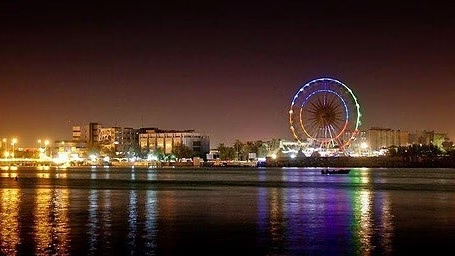By Layla Al-Salim ~
It’s a night of spring, a Thursday evening in Basra, and the pounding of the drum circle resounds over the malarial city rooftops. The circle of laughter, bobbing teenagers, parents on the precipice—some bobbing, others with rivulets of tears streaming down their faces. For a city which had been so many years bound by its agony, this night there is a different beat: the beat of healing.
For almost two decades, Basra could not escape war. The port city in the south of Iraq, the so-called “Venice of the East,” was battered by a string of wars, rebellions, and sectarian violence. Now, though, a less flamboyant revolution is brewing—not in courtrooms or barracks, but in music schools, parks, and community centers.
The Power of Rhythm and Reconnection
Basra Harmony Initiative started with a single teacher, six pupils, and an oud in 2022. Five districts are now serviced with the initiative where the initiative has positively impacted more than 300 children between 10-18 years old. The plan is visionary simple yet bold: educate via music resilience, learn to write harmony, and a culture of happiness in a country where trauma had been the shadow that overshadowed everything else.
“We don’t learn scales and notes,” says violinist-turned-music therapist Fatima Al-Zuhair, who developed the program with another instructor. “We learn trust, teamwork, and self-expression—things many of these children never knew.”
Her efforts are also scientifically supported. Music is therapeutic, as found in a World Health Organization report, particularly among children war and migration victims. More than 1.2 million of its citizens are displaced in Iraq alone, where 27% of the young people are unemployed, which means that such programs fill in gaps emotionally and society-wise.
Strings and Stories
Haider, who was 14 at school with Fatima’s and left an orphan by the bombing that killed his father in 2007, used to invent nightmare stories for years and vent on others. “I beat walls,” he confesses, hugging a rusted darbuka drum. “Now, I play.”.
With weekly jam sessions and songwriting workshops, students such as Haider are well able to feel and convey emotion through music. They sing of homeland lost and dreams for the future and now peace. Concerts even unite religious and ethnic community families—slient but powerful act of reconciliation.
“We held an Eid concert,” says Jordanian Al-Zuhair. “A Sunni boy was singing a duet with a Christian girl. They never spoke a word to one another. They hugged one another in the evening.”
Government Support and Cultural Roots
Despite that, Iraqi music education was seriously lost after 2003, there is optimistic evidence of revival. Iraq’s Ministry of Culture is currently involved in providing such grassroots provision in children’s mental health and creativity through support from NGOs like Save the Children and Musiqati. In Basra, these have involved support in funding instruments and teacher training, as well as public performance.
Clearly, the classes tap into Iraq’s rich musical heritage. From maqam to chalghi ensemble, teachers mix traditional Iraqi melodies with contemporary practice, upholding cultural pride and heritage.
None of the children were aware that their city had poets and composers, volunteer historian Ahmed Ridha says. “We are not teaching Western thoughts—we are reclaiming our own.”
Healing Beyond the Notes
In a nation yet to recover from sectarian massacres and economic ruin, music is not the solution. It’s the beginning.
The new UNICEF report on Iraq this week concluded arts community projects improved emotional well-being for 35% of kids in Basra. Violence from teacher to pupil was decreased, as well as disturbances among children in areas where there were properly run music centers registered by local police.
“Effect occurs,” Al-Zuhair goes on. “Not only to the children—but to society. When you provide individuals with something they can be proud of, something that they can show to other individuals, the quiet of trauma begins to unravel.”
As sunset falls below the Shatt al-Arab river, drums echo in the park. A melancholic few chords plod along on a poor sound system—someone practicing a new piece. A jubilant little girl laughs as she shakes her tambourine, flat but not yet broken. Basra, still war years, is singing once more.
References

